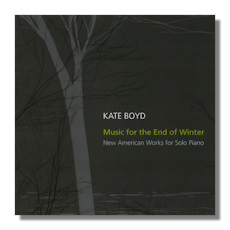
The Internet's Premier Classical Music Source
Related Links
- Latest Reviews
- More Reviews
-
By Composer
-
Collections
DVD & Blu-ray
Books
Concert Reviews
Articles/Interviews
Software
Audio
Search Amazon
Recommended Links
Site News
 CD Review
CD Review
Music for the End of Winter

- John Halle: Etude 2000
- Howard Frazin (born 1962): Music for the End of Winter
- Frank Felice: three pieces from banff
- Michael Schelle (born 1950): Hammerstein
- Daniel Koontz (born 1969): Improvements for Piano
Kate Boyd, piano
Ravello RR7806
This is a pleasing, punchy, original (though somewhat short, at under 50 minutes) recital of contemporary piano music played by Kate Boyd from the small Ravello label at the Eidson-Duckwall Recital Hall, Butler University, Indianapolis, Indiana. It's a warm and intimate acoustic and Boyd's piano is closely miked to add immediacy and presence to a style of playing that's inviting without cloying. An advocate of new (piano) music, Boyd also works with small groups and with music from the 18th to 21st centuries.
Her playing is accomplished, persuasive, forthright but expressive; as though she's playing for your ears only. Some listeners might find over the course of multiple exposures to the music that Boyd brings insufficient dynamic variety to her playing. Yet she brings to her interpretations true insights as to how the composers (all apparently living) would want their music to sound. Some of the tempi and textures are demanding. Boyd negotiates these passages with grace. She also tackles the quotation-like movements, particularly in Schelle's Hammerstein… Liszt, Rachmaninov, Beethoven, Stravinsky, Bach and so on, with subtlety and a sophistication that quite makes them work. This particular piece, this genre indeed – homage not pastiche – infuses the CD with its unpretentious joy at fitting short form to concentrated content and taking the wry and the personal musing as seriously as they deserve. Boyd is able to respect and celebrate this tone through her technique and sensitive resonance with the composers' intentions throughout.
John Halle's work is interesting: he's as much a theoretician and humorist as a composer, his work breaks little new ground but – at under four minutes here – Etude 2000 serves as a suitable and happy call to attention. The work from which the CD takes its title is next: the five short movements of Howard Frazin's Music for the End of Winter are unashamedly fragmentary and somewhat impressionistic… "the remnants of an anxious and uncertain inspiration." They are far from tentative and portray the sparseness of the season they allude to well. Again, Boyd's approach is sensitive yet without sentiment.
Frank Felice's three pieces from banff (initial lower case "b" intended) are equally unrelated and hail from the world of the study too. The dozen Improvements for Piano by Daniel Koontz are perhaps the most satisfying, certainly the most impressive, set on this CD. Based on very pianistic improvisations, they challenge the player's technique. Boyd's response is more than adequate. These two are studies, perhaps, in succeeding with them as a player. Therein lies the player's "improvement". There is much that is superficially plain, only marginally difficult to navigate; yet which, upon closer inspection and repeated hearing, truly stretches our expectations of the concert piece and the pianism of the performer.
A nice, self-contained, unpretentious CD, then, which showcases good contemporary (though hardly avant-garde) piano composition. The acoustic is all but flawless; the booklet nicely-produced, though a little short on detail at under six pages in total. This is a self-contained, penetrating and very enjoyable CD which can be safely recommended to lovers of the contemporary piano – especially for the work of modern composers whose work doesn't get the exposure that Kate Boyd conclusively demonstrates it should.
Copyright © 2011, Mark Sealey.




















